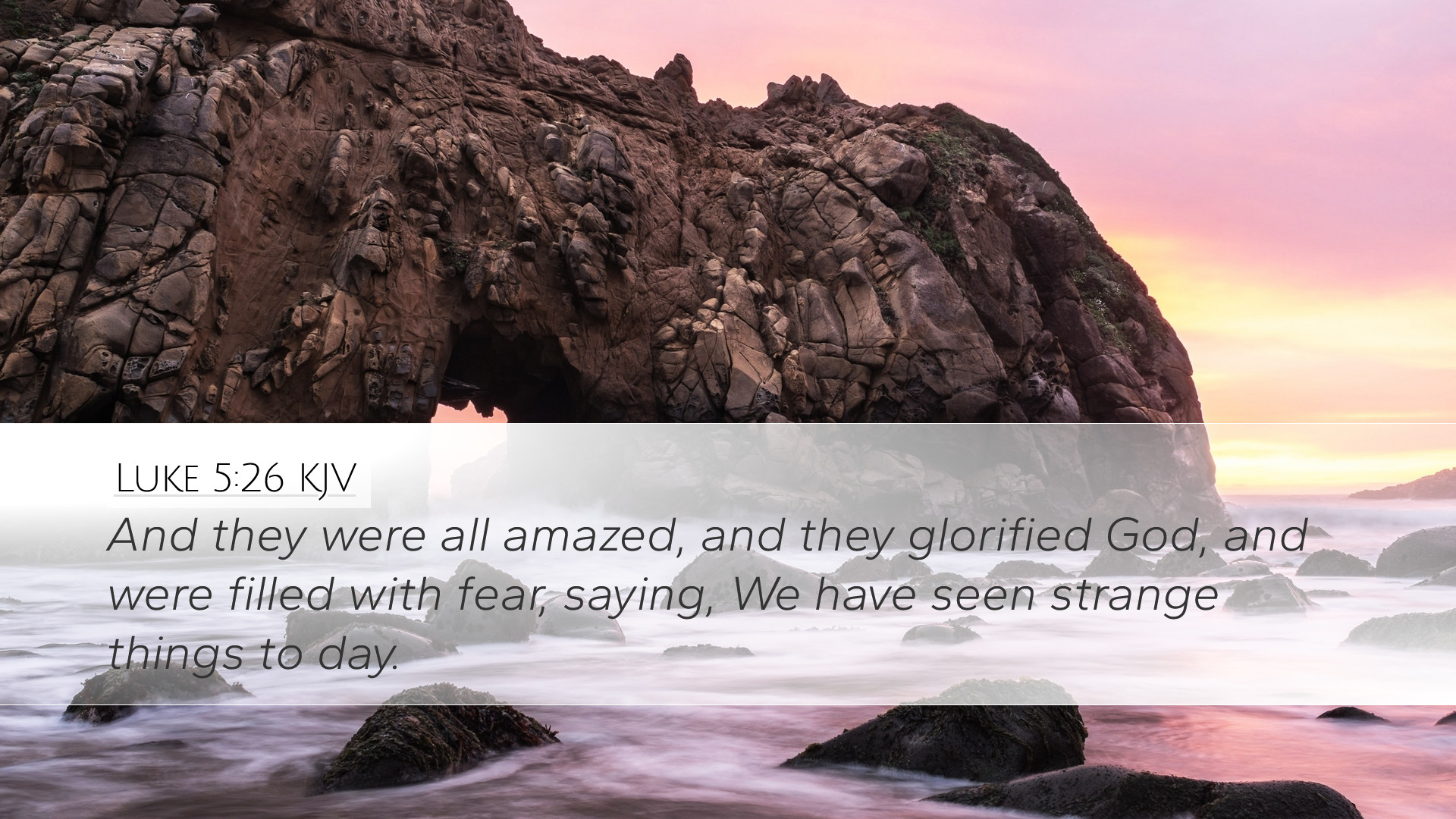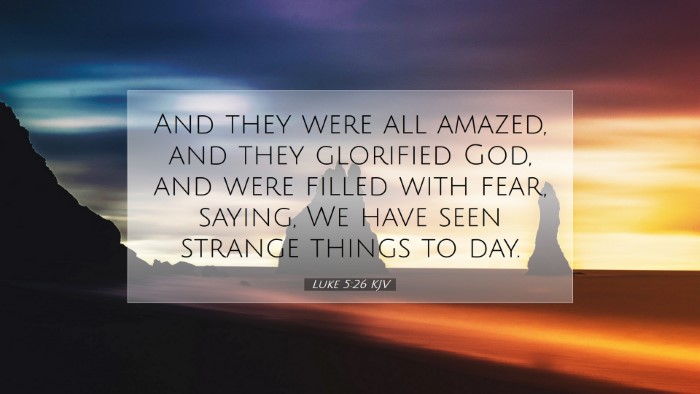Bible Commentary on Luke 5:26
Luke 5:26 states: “And they were all amazed, and they glorified God, and were filled with fear, saying, We have seen strange things to day.” This verse serves as a profound reflection of the miraculous works of Christ and the diverse responses of those who witness His acts. The ensuing commentary seeks to explore the implications of this passage through insights derived from esteemed public domain commentaries.
Contextual Overview
Luke 5:26 falls within the broader narrative of Jesus’ ministry, specifically following His healing of a paralytic (Luke 5:17-25). The setting is a crowded space where faith and divine power converge, illustrating both the physical and spiritual healing that Jesus embodies. The context suggests a pivotal moment where Jesus demonstrates authority over physical ailments and the ability to forgive sins.
Insights from Classical Commentaries
Matthew Henry
Henry emphasizes the amazement of the onlookers, asserting that such astonishment is a common response to divine intervention. He notes that the miracle not only cured the paralytic but also revealed the nature of Christ's authority, invigorating the faith of those present.
- Amazement and Fear: Henry points out that the amazement of the crowd is intertwined with fear. This reaction is indicative of the power of God being manifest among them, prompting both reverence and wonder.
- Glorification of God: The act of glorifying God reflects a natural human response to witnessing divine work. Henry suggests that believers should continually acknowledge God's greatness as a core aspect of worship.
- Strange Things: The phrase "strange things" indicates that the works of Jesus were beyond human comprehension, presenting a challenge yet an invitation to deepen faith.
Albert Barnes
Barnes provides a detailed examination of the implications of witnessing miracles and the necessary acknowledgment of divine power. He encourages readers to view this passage as a call to faith beyond mere amazement.
- Relation to Belief: Barnes asserts that witnessing miracles is not an end in itself but serves to lead individuals towards a deeper belief in Christ’s divinity and mission.
- God’s Purpose: The miraculous signs serve a purposeful role in redirecting the hearts of men towards God. Each miracle thereby acts as a stepping stone for faith and conversion.
- Reflections on Fear: Fear, in this context, is seen as reverence; it invites a reflection on the holiness of God and should lead to humility before Him.
Adam Clarke
Clarke adds depth to the understanding of the term "strange things", noting that it points to the extraordinary nature of Jesus' ministry. His analysis underscores the transformative power of faith and healing.
- Extraordinary Works: Clarke highlights the unprecedented nature of Jesus’ miracles and argues that His works were designed to provoke thought and introspection among the witnesses.
- Impact on The Community: The reverent response of the people is indicative of a communal acknowledgment of divine authority, showcasing a collective encounter with the sacred.
- Call to Discipleship: Clarke notes that this event is also a precursor to the call of the disciples, illustrating how divine acts compel individuals to a greater purpose within God’s kingdom.
Theological Implications
The theological implications of Luke 5:26 can be distilled into several key reflections:
- The Nature of Miracles: Miracles in the scriptural narrative are not merely acts of supernatural intervention; they are expressions of divine glory meant to draw humanity closer to God.
- Faith’s Role: The faith of the witnesses—and indeed, the faith of the paralytic—serves as a foundational aspect of experiencing miracles, reminding us that belief is a prerequisite for encountering God’s power.
- Community Response: The communal response of glorifying God showcases that divine acts serve to unify believers in a common purpose of worship and reverence.
- Fear and Awe: The healthy fear inspired by witnessing God’s power is essential in cultivating a relationship built on respect, humility, and acknowledgment of His sovereign authority.
Conclusion
In summation, Luke 5:26 encapsulates a moment of divine revelation that prompts believers to take stock of their faith response to God’s mighty works. The combined insights from Henry, Barnes, and Clarke demonstrate the multifaceted nature of amazement, reverence, and glorification in the life of the believer. For pastors, students, theologians, and scholars alike, this passage serves as a profound reminder that every act of God is an invitation to deeper faith and understanding of His kingdom.


